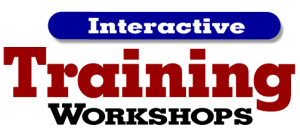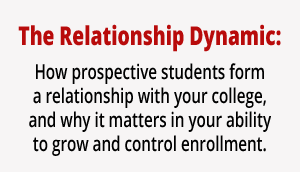It never fails: As summer approaches we visit with a number of college enrollment managers who are still working frantically to finalize their incoming class. The question they ask us most often is, “How can I coach my staff to nudge prospective students off the fence?”
Our answer: When someone is stuck they need more than a nudge, they need to be lifted over that fence. The bottom line is that when you are working with a non-committed student in the late stage of the cycle, you can be certain that there’s a concern or objection that hasn’t been addressed. And, no matter where you are in the recruiting cycle, it is a GOOD thing when a prospective student or parent communicates a concern or objection about your college. Really.
When a concern or objection is revealed, you can deal with it. If they don’t share their concerns, they’ll never enroll and you’ll never know why. There are several great ways to cope with objections and concerns. But the first thing you have to do is to determine whether they exist.
The easiest way to do this is simply to ask.
Ask the student whether they have any concerns or questions that would prevent them from attending your school. If they acknowledge that concerns exist, you have to isolate each one and respond to it.
Questions, concerns, objections and indifference almost always arise during the college shopping process. And they vary widely. We train admission counselors in a variety of effective methods to manage each type. One of our favorite techniques is called the “Feel, Felt, Found” method of responding to a student’s concern.
Let’s take the student who is “fence sitting” about enrolling for classes that begin in just two months. Your previous conversations have gone well and you have been told that your college is a likely choice but the student has failed to take the final step. It’s time to probe for the core concern and you should be direct.
You ask, “What’s holding you back?”
The student replies, “My high school is pretty small and everybody knows each other. Your campus is SO big. I’m afraid I’ll get lost in all these people.”
With “Feel, Felt, Found” you can reassure them by saying, “I understand how you feel. I’ve talked to a lot of students from small high schools who felt the same way you do …
… In fact, Ashley, who interns in our admissions office, felt that same way before she enrolled here …
… But after coming, she found out how easy it is to meet people and form close friendships with students on our campus who have similar interests. I’m sure that will happen for you, too. Let’s get you signed up to attend our freshman retreat in July where you’ll make friends with students from big and small high schools.”
“Feel, Felt, Found” helps to dissolve a concern or objection by confirming that others had similar concerns that turned out to be unfounded. Often, it’s all you need to lift a student over the fence and onto the exciting next chapter of his or her life.
We teach new and experienced counselors how to work smarter, recruit more effectively and, most importantly, adopt a student-centric approach to everything they do.
Longmire and Company’s on-campus Interactive Training Workshops dramatically improve the performance of counselors and staff in areas such as effective communication with students and parents, applying creative entrepreneurship to their jobs, validating past and planned actions against outcomes, and discovering and leveraging the motivations of students (and themselves).
The net result? Improved service to prospective students and families, measurable increases in yield, increased counselor and staff job satisfaction, enhanced teamwork, and innovations in work process within the department. From my many years in enrollment management, I know that summer is the ideal time to train and motivate your staff. Email or call me if you are interested in how we can help you have a powerhouse admissions team.
Continue the conversation on Twitter @LongmireCo. Be sure to Subscribe to Versions of Conversion today so you don’t miss any of this highly-valuable information.
 Karen Full is a highly-respected higher education professional who has held positions in admissions and enrollment management at several institutions in the Midwest and Florida. With her vast experience working with large and small, public and private colleges, Karen brings a valuable perspective to her role as an Enrollment Strategist at Longmire and Company.Call Karen at 913/492.1265 x.711 or email her at kfull@longmire-co.com. Follow Karen on Twitter @KarenAFull.
Karen Full is a highly-respected higher education professional who has held positions in admissions and enrollment management at several institutions in the Midwest and Florida. With her vast experience working with large and small, public and private colleges, Karen brings a valuable perspective to her role as an Enrollment Strategist at Longmire and Company.Call Karen at 913/492.1265 x.711 or email her at kfull@longmire-co.com. Follow Karen on Twitter @KarenAFull.


 Pick any attribute and benefit that you communicate about your college and in all likelihood there are many other colleges that are saying exactly the same thing. Falling into this trap is essentially the same as stepping up to the plate and calling two strikes on yourself before the first pitch. You can’t differentiate your college in the hearts and minds of prospective students.
Pick any attribute and benefit that you communicate about your college and in all likelihood there are many other colleges that are saying exactly the same thing. Falling into this trap is essentially the same as stepping up to the plate and calling two strikes on yourself before the first pitch. You can’t differentiate your college in the hearts and minds of prospective students.



